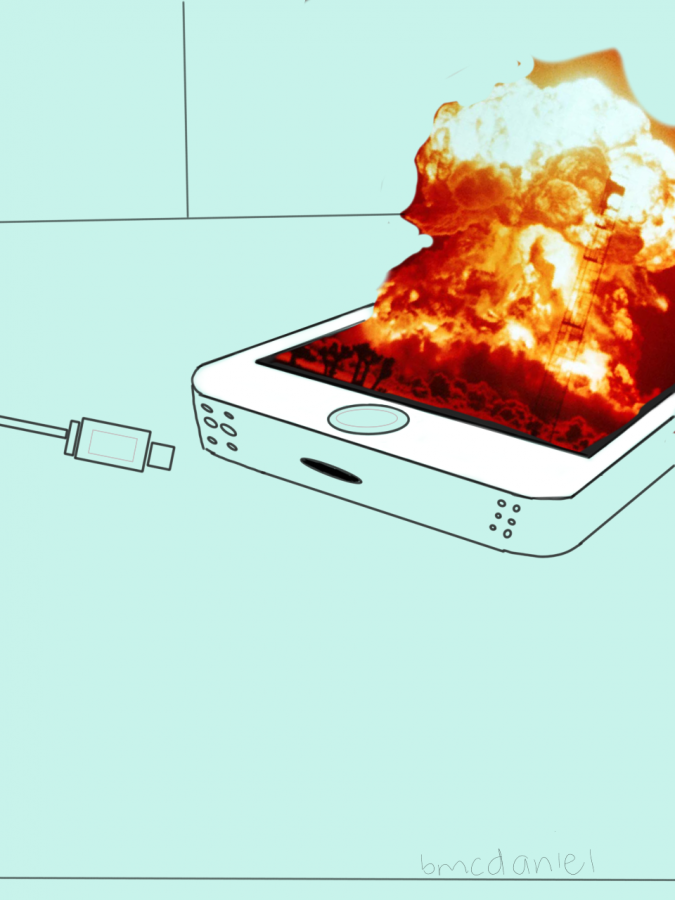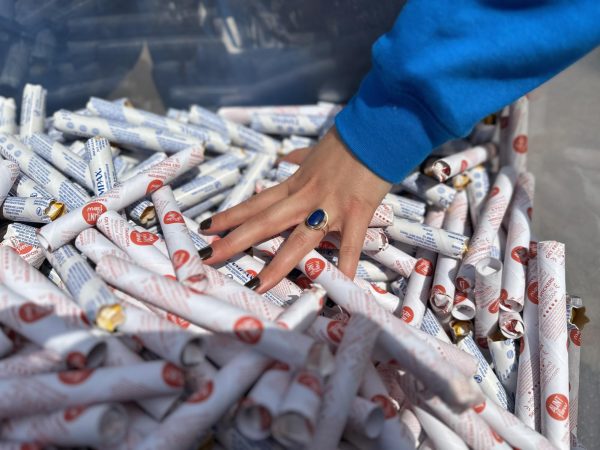Samsung’s ‘Note 7’ exploding phone fiasco
Disfunctioning phone may ruin the company’s capital and reputation
The Samsung Galaxy Note 7 was set to be the year’s greatest smartphone. It received some of the best reviews of any device of 2016, beating the iPhone 7in many cases.
There was just one flaw with the Note 7’s: they exploded.
A mere three weeks after its launch, reports of fires and explosions led to Samsung pulling the device from the shelves and starting an exchange program.
Samsung acted quickly and sent out revised units that were supposed to be safe to use. Just a few days later, reports of revised Note 7’s exploding began to surface, with one catching fire on a Southwest flight.
After that, Samsung made the decision to completely discontinue and recall all of their Note 7 devices. The company is expected to lose $17 billion as a result.
I think the $17 billion in lost sales and profits is only the tip of the iceberg. Samsung is the largest mobile phone manufacturer in the world, selling over 81 million devices in the first three months of this year. A $17 billion hit, while it may sound extreme, is not that much to the company as a whole.
The real problem the company is facing is customer loyalty. A recent surveyfound that 40% of Samsung customers are unlikely to ever buy another Samsung device. This is a critical blow to the company, especially now, with Apple, Google and LG all releasing new flagship devices.
I have been a devoted Samsung customer for years, and I loved my Galaxy Note 7 for the three weeks I had it. After the recall, I decided that I don’t trust them enough to continue buying from them. I purchased a Google Pixel XLinstead.
Samsung doesn’t just make phones, though. They also manufacture computers, washers and dryers, dishwashers, microwaves, ovens, refrigerators, televisions and much more. In South Korea, Samsung owns hospitals and universities, and their presence can be seen in virtually every aspect of life there.
This can be good, or very bad for Samsung and South Korea. It’s good that they are invested in more than just the cell phone market, and this makes the financial burden of the Note 7 easier to carry. However, if their brand value continues to fall, their other industries could be affected. Samsung’s stock is down 8%, and that can have serious ramifications.
If their customer base takes the hit analysts are predicting, then sales of their upcoming Galaxy S8 smartphone could be very underwhelming. This could cause a ripple effect throughout the company, leading to further losses and a larger decrease in brand value. This could be detrimental to South Korea’s economy, since Samsung is their largest exporter.
Despite their best efforts, Samsung will have difficulty convincing people their phones are safe. This is not the first time a popular device has caught fire, but it is the first to do so on such a large scale. Over 112 Note 7’s have caught fire. That number may seem small out of the 2.5 million sold, but it is enough to lead to the dangerous situation Samsung got themselves into.
If consumer safety is really Samsung’s top priority, then they should have done more extensive testing to avoid releasing a dangerous handset into the market.
It is unacceptable for a company of Samsung’s caliber to put consumers at risk. Their actions will hurt themselves and their home country significantly. It will be difficult to bounce back from this, and other companies will undoubtedly capitalize off Samsung’s ‘explosive’ failure.
Carson Predovich can be reached at [email protected] or @cpredo120 on Twitter.



















NotASheep // Nov 3, 2016 at 5:40 pm
Doubt it’s going to change anything since there’s no other alternative phone with Wacom pen and unique feature set.
Nicole // Nov 3, 2016 at 5:41 am
I was very much looking forward to the note 7. I have a note 4, and love it. Of course I’d likean upgraded note. Will they be working on a note 8?
kwan Carpenter // Nov 3, 2016 at 4:46 am
I’m are very proud Samsung Galaxy and very disappointed but looking forward to seeing good quality. .
Amlan // Nov 3, 2016 at 2:14 pm
It may burn your home or car are you ready to test it…….. yeah note 8
stephen broad // Nov 3, 2016 at 3:04 am
Especially a phone…
stephen broad // Nov 3, 2016 at 3:03 am
I have always loved Samsung products……. But now I am afraid to purchase one…..
MR Robert Gow // Nov 2, 2016 at 11:18 pm
I think its really sad that the phones were never tested properly,,what caused the technical hicup?Why ?is it because they put an inferior cheaper part in the note 7..im wary every time i charge my s7 edge..because the fumes could be deadly to an already damaged liver..
Amlan // Nov 3, 2016 at 2:12 pm
Ha ha lol.
Justine // Nov 2, 2016 at 10:14 pm
Your survey showing 40% of Samsung customers not sticking with the manufacturer seems very high. How many people were surveyed? And by whom?
I strongly doubt Samsung would overall lose that much loyalty in the long run. Once the Note 8 is released I am sure all their past devotees will be running to the stores. After all… people do forget, the severity and inconvenience will fade and that new Note 8 will be like a beacon of light! 🙂
Amlan // Nov 3, 2016 at 2:11 pm
Still Samsung (somesoong) couldn’t find why it lits. They will be very good if they make lighters.
Bethany Taylor // Nov 2, 2016 at 9:57 pm
LOVED, LOVED, LOVED, my Note 7!!!!!
Almost cried when I had to give it back.
I still prefer Samsung phones over any others and got a Galaxy S7 Edge.
Wafflehead // Nov 2, 2016 at 8:33 pm
I went to the IPhone 6s Plus. Crappy camara
Amlan // Nov 3, 2016 at 2:07 pm
If you are a photographer why don’t you buy high end camera. It’s just a phone. And if you compare yes the pictures are much brighter compare to 6s p. But Samsung freezes iPhone doesn’t. Samsung is not worth paying your hard earned money but you can trust Apple. One Apple a day makes doctors away. Don’t get burn just enjoy